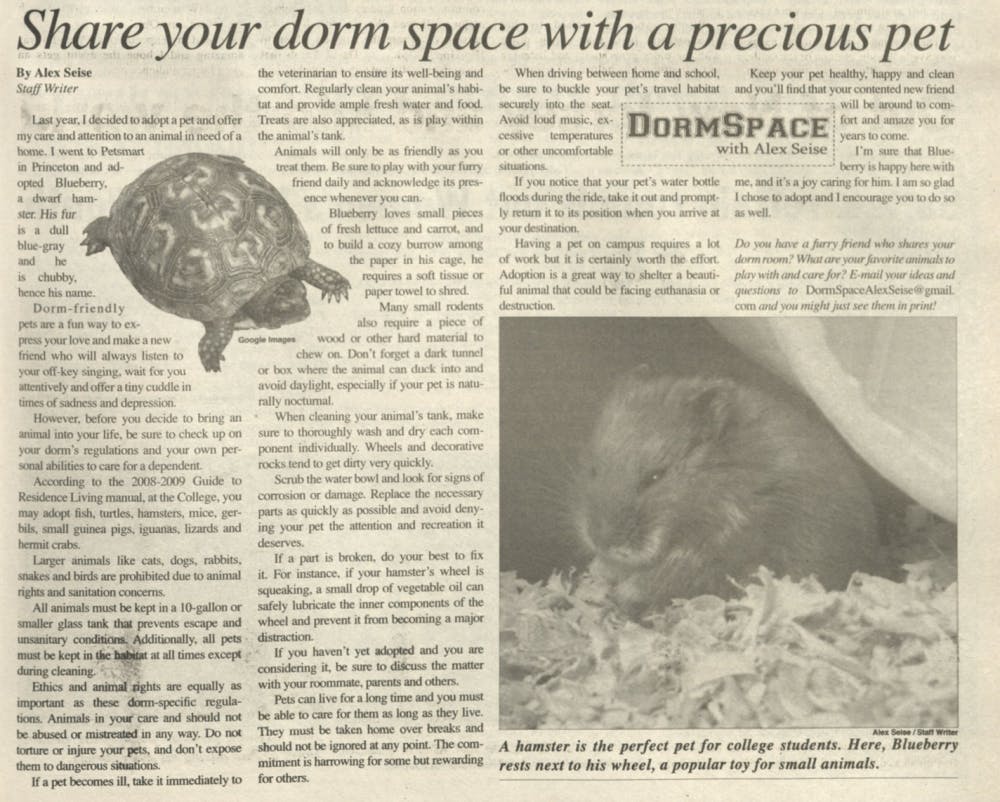By Liya Davidov
Features Editor
Although spring break is coming up, many students are too overwhelmed to even think about it. Between midterms, projects and mid-semester progress reports, this time of year is difficult for any student.
In an April 2008 issue of The Signal, a staff writer suggested livening up this time of year with a dorm-friendly pet. Having a furry, scaley or bubbly friend around could be everything students need to rekindle their joy.

Dorm-friendly pets are a fun way to express your love and make a new friend who will always listen to your off-key singing, wait for you attentively and offer a tiny cuddle in times of sadness and depression.
However, before you decide to bring an animal into your life, be sure to check up on your dorm's regulations and your own personal abilities to care for a dependent.
According to the 2008-2009 Guide to Residence Living manual, at the College, you may adopt fish, turtles, hamsters, mice, gerbils, small guinea pigs, iguanas, lizards and hermit crabs.
Larger animals like cats, dogs, rabbits, snakes and birds are prohibited due to animal rights and sanitation concerns.
All animals must be kept in a 10-gallon or smaller glass tank that prevents escape and unsanitary conditions. Additionally, all pets must be kept in the habitat at all times except during cleaning.
Ethics and animal tights are equally as important as these dorm-specific regulations. Animals in your care and should not be abused or mistreated in any way. Do not torture or injure your pets, and don't expose them to dangerous situations.
If a pet becomes ill, take it immediately to the veterinarian to ensure its well-being and comfort. Regularly Clean Your animal's habitat and provide ample fresh water and food. Treats are also appreciated, as is play within the animal's tank.
Animals will only be as friendly as you treat them. Be sure to play with your furry friend daily and acknowledge its presence whenever you can.
Blueberry loves small pieces of lettuce and carrot, and to build a cozy burrow among the paper in his cage, he requires a soft tissue or paper towel to shred.
Many small rodents also require a piece of wood or other hard material to chew on. Don't forget a dark tunnel or box where the animal can duck into and avoid daylight, especially if your pet is naturally nocturnal.
When cleaning your animal's tank, make sure to thoroughly wash and dry each component individually. Wheels and decorative rocks tend to get dirty very quickly.
Scrub the water bowl and look for signs of corrosion or damage. Replace the necessary parts as quickly as possible and avoid denying your pet the attention and recreation it deserves.
If a part is broken, do your best to fix it. For instance, if your hamster's wheel is squeaking, a small drop of vegetable oil can safely lubricate the inner components of the wheel and prevent it from becoming a major distraction.
If you haven't yet adopted and you are considering it, be sure to discuss the matter with your roommate, parents and others.
Pets can live for a long time and you must be able to care for them as long as they live. They must be taken home over breaks and should not be ignored at any point. The commitment is harrowing for some but rewarding for others.







